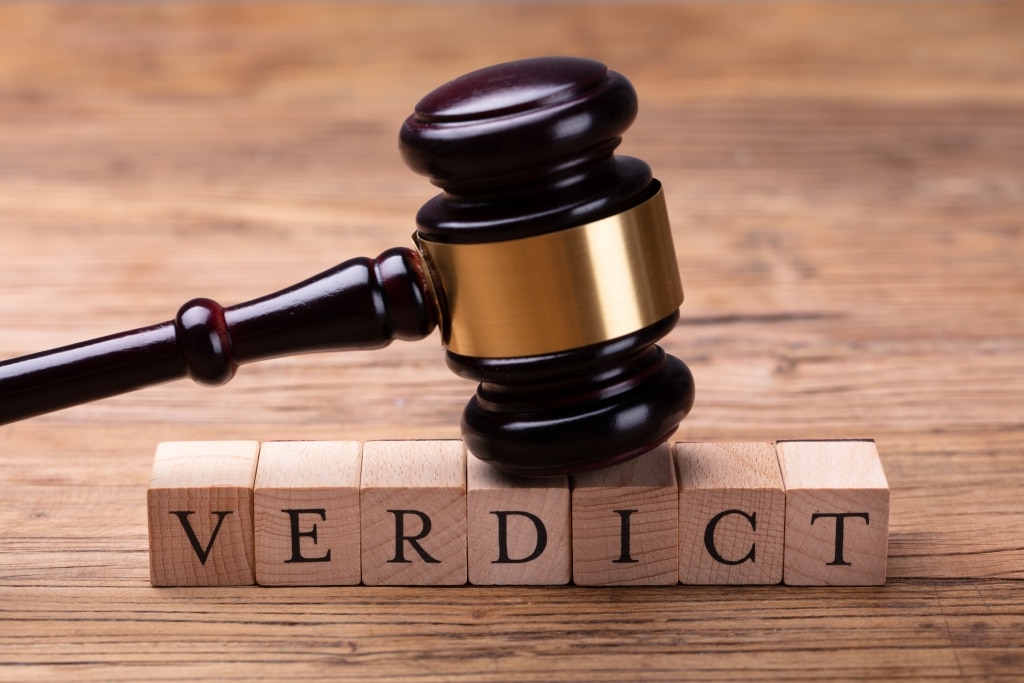
Verdict
A verdict is the formal decision made by a jury or judge regarding the outcome of a legal case. In trials, the verdict determines whether the defendant is found liable or not in civil cases, or guilty or not guilty in criminal cases. Reached after the presentation of all evidence and arguments, a verdict represents the resolution of the case and can lead to a range of outcomes, including compensation in civil cases. At 770GoodLaw, we guide clients through each step leading to a verdict, advocating for a fair outcome that fully addresses their needs and rights.
Types of Verdicts
Verdicts can vary depending on the type of case and the issues at hand. In both civil and criminal cases, verdicts conclude the trial and often provide clarity for both parties. Common types of verdicts include:
- Liability Verdict: In civil cases, such as personal injury or car accident claims, a verdict of liability means that the defendant is found responsible for the plaintiff’s injuries or damages.
- Not Liable Verdict: In cases where the evidence does not sufficiently establish the defendant’s responsibility, a not liable verdict is issued, meaning the defendant is not held accountable for the damages.
- Guilty Verdict: In criminal cases, a guilty verdict indicates that the prosecution has proven beyond a reasonable doubt that the defendant committed the crime.
- Not Guilty Verdict: A not guilty verdict signifies that the prosecution did not meet the burden of proof, resulting in the defendant’s acquittal.
The Verdict Process in Civil Cases
In civil cases, the verdict process involves several steps, each critical to the outcome of the case. Here’s an overview of how a verdict is typically reached in personal injury and accident cases:
- Presentation of Evidence: Both parties present evidence, witness testimonies, and expert opinions to establish their arguments and counter opposing claims.
- Closing Arguments: After all evidence is presented, each attorney makes a final statement, summarizing the case and urging the jury or judge to consider specific aspects when making their decision.
- Jury Deliberation: In jury trials, the jury meets privately to discuss the evidence and reach a consensus. Deliberations may take hours or days, depending on the complexity of the case.
- Delivery of the Verdict: Once a decision is made, the jury or judge returns to the courtroom to announce the verdict. In civil cases, this verdict often includes details on liability and compensation amounts.
Factors That Influence Verdicts
Several factors can impact a verdict, especially in personal injury and accident cases where damages and liability are in question. Common influences include:
-
Quality of Evidence: Strong, clear evidence that supports the plaintiff’s claims can significantly impact the likelihood of a favorable verdict.
-
Credibility of Witnesses: Witness testimonies that are consistent and reliable can influence the jury or judge’s perception of the case’s facts.
-
Jury Perception: In jury trials, the jurors’ personal beliefs, experiences, and interpretations of the evidence play a role in their final decision.
-
Legal Arguments: Effective arguments made by attorneys, particularly in highlighting the strengths and addressing weaknesses, can shape the jury’s understanding of the case.
The Role of the Judge in the Verdict Process
In addition to overseeing the trial, judges play a key role in the verdict process by ensuring legal procedures are followed. In cases without a jury, the judge alone issues the verdict, assessing all evidence, testimonies, and legal arguments. Even in jury trials, judges may influence the verdict by clarifying legal principles and instructing the jury on relevant laws.
Judges also have the authority to set aside a jury verdict if they determine that it is not legally sound or if they believe the jury acted with bias. This power underscores the importance of fairness and adherence to the law in every case.
How 770GoodLaw Supports Clients Through the Verdict Process
At 770GoodLaw, we are dedicated to providing our clients with strong, strategic representation throughout their case, working toward a favorable verdict. Our attorneys ensure that every piece of evidence and testimony is presented compellingly, maximizing the chances of a positive outcome. Our approach includes:
- Thorough Case Preparation: We gather comprehensive evidence, witness statements, and expert opinions to build a solid case for our clients.
- Clear Presentation of Evidence: Our attorneys present evidence clearly and effectively, emphasizing the facts that best support our clients’ claims.
- Strong Closing Arguments: We craft persuasive closing arguments that highlight key points and address potential weaknesses, urging the jury or judge toward a favorable verdict.
- Supporting Clients Throughout: We guide our clients through each stage of the trial, providing them with clarity and support as the case moves toward a verdict.
Importance of Legal Representation in Securing a Favorable Verdict
Legal representation is essential for securing a favorable verdict, as skilled attorneys understand how to present evidence, challenge opposing claims, and frame arguments effectively. At 770GoodLaw, our attorneys are experienced in handling complex cases and committed to ensuring that our clients receive a fair and just outcome. From case preparation to verdict, we stand by our clients, advocating for their rights and best interests.
Why Choose 770GoodLaw for Your Case
With our commitment to Relentless Reliability and Sincetegrity, 770GoodLaw provides the guidance and expertise clients need to approach the verdict process with confidence. Our experienced attorneys work diligently to help clients achieve fair verdicts, ensuring that justice is served in each case.






